Amazon Would Like The Key To Your House
What could possibly go wrong?
Amazon is preparing to offer a new level of delivery service that would allow delivery persons to gain access to your house so they can leave packages inside:
SEATTLE — For many online shoppers, packages often linger for distressingly long hours outside their homes, where they can be stolen or soaked by rain. Now, if customers give it permission, Amazon’s couriers will unlock the front doors and drop packages inside when no one is home.
What could possibly go wrong?
The head spins with the opportunities for mischief in letting a stranger into an empty home. There are risks for couriers too — whether it’s an attacking dog or an escaping cat. To allay these concerns, Amazon is asking customers to trust it — buy a package of technology including an internet-connected smart lock and an indoor security camera.
Amazon isn’t the only business that believes this is the future of internet shopping, as well as other services that require home access, like dog walking and house keeping. This summer, a start-up that makes smart locks, Latch, struck a deal with Jet.com, an online shopping site owned by Walmart, to jointly pay for the installation of its locks on 1,000 apartment buildings in New York City to make deliveries easier. The arrangement offers some of the security of a doorman for people who live in buildings without them.
E-commerce companies have experimented with ways of making deliveries more secure for years. Amazon installs self-service lockers in office buildings and outside supermarkets where customers can fetch their orders, and Daimler and other carmakers have tested the delivery of goods from Amazon and other retailers to customers’ car trunks.
The costs of package theft aren’t known — Amazon, for example, will not say — but are probably substantial. Most people who have spent any time on a neighborhood blog, social network or email list have a sense of how prevalent such crime is. And packages sitting on front porches can also signal to anyone who walks by that the homeowners are away.
Ryan Calo, a law professor at the University of Washington who specializes in legal issues related to technology, said Amazon’s new service relies on the same kind of trust homeowners commonly extend to services to which they hand over their keys. But he said those agreements often involve in-person interactions, which won’t happen when homeowners allow Amazon to unlock its doors.
“It raises questions about how do you specify and police expectations when the relationship is one mediated almost entirely by technology?” Mr. Calo said.
Amazon’s new service, Amazon Key, will require customers to buy a kit that starts at $250 and includes a security camera made by the company and a smart door lock made by Yale or Kwikset. When a delivery comes to a customer’s door, the lock first helps Amazon verify that the driver is at the correct address at the appropriate time. It then starts recording video and unlocks the door, capturing the entire visit.
“Customers told us they really want to understand and see what’s happening when deliveries are happening,” said Charlie Tritschler, vice president for Amazon devices. “It gives them assurance.”
Amazon is also offering the camera, called Amazon Cloud Cam, as a stand-alone product for $120, significantly less than other internet-connected cameras.
Amazon says it will guarantee protection for customers in the event a driver damages or steals something inside a home. It suggests homeowners keep pets away from front doors when deliveries are expected. If drivers can’t safely make deliveries, they’ll leave packages outside.
The company said Amazon Key will be available in 37 cities in the United States starting Nov. 8 and open to its Prime members, who pay $99 a year for fast shipping and other benefits. The system can also be used to grant home access to other services, such as Merry Maids, a housecleaning provider, and Rover.com, a dog-walking site.
The potential Fourth Amendment issues that Professor Calo raises in the article above are interesting, but I tend to doubt that consenting to a service such as this would have any real impact on the reasonable expectation of privacy issues that are important in deciding whether a police search was proper or not. The fact that you allow someone into your home for a specific purpose — whether it’s cleaning, dog sitting, or to deliver a package — doesn’t seem to me to be relevant for Fourth Amendment purposes. This is because there is clearly a marked difference between consenting to a commercial service to enter your home for a specific purpose (cleaning, dog walking, delivering a package, etc) and the contours of privacy protected by the 4th Amendment. Additionally, you can draw a distinction between a consensual entry for commercial purposes and a potential warrantless search by law enforcement. Therefore, I doubt that Amazon Key, or hiring a dog walker for that matter, has any real impact on your rights under the Fourth Amendment. That being said, there’s much about this idea that is questionable,
The Washington Post’s Christine Emba does a pretty good job of explaining why:
The thought processes of Silicon Valley innovators are a curious thing. Many observers have noted that the most common proposals seem to fall into the category of “things that I, a 25-year-old man, wish that I could still get my mother to do for me.” But even more eyebrow-raising is the fact many of these ideas share a curious misunderstanding of the average person’s hierarchy of goods — what things matter to them, and how much. It may come as a surprise to those who are willing to live in Google’s parking lot and drink Soylent meal replacement instead of eating real food, but some of us care about more than just convenience.
(…)
Amazon Key is perhaps the most outre example of this phenomenon yet. Yes, I do value convenient deliveries, but I value my security more — better to strategize around postal schedules than be assaulted by a person hiding in one’s home! And while I dislike rained-upon packages, I prioritize privacy enough that I’m loath to install a corporate-controlled surveillance apparatus inside my house
New technologies are often packaged as amenities we shouldn’t have to live without, and any trade-offs are made to seem meager in the face of potential comfort. But there’s more to life than convenience — maybe someone should let Silicon Valley know.
I tend to share Embre’s skepticism about this kind of new “service.” I haven’t really experienced an issue with package theft myself, but I do know that it’s an issue in some neighborhoods and in some parts of the country, especially given the fact that packages are typically delivered during work hours when most people aren’t home and we’re long past the days where you could rely on the fact that neighbors would be at home while you’re away at work to intercept a package you happen to be expecting. I’ve also heard tales from friends and others about packages that were delivered but then weren’t there when they arrived home at the end of the day, an indication that the package itself was taken by someone hoping that whatever was inside would prove to be valuable. The service Amazon is offering would seem to deal with that problem quite effectively by allowing a delivery person to get inside your house to leave the package rather than leaving it on a front porch or doorstep where it would be visible to anyone who happened to pass by your home. An added convenience is not having to worry about possible damage to a package in the event its delivered on a day when the weather is inclement or exceedingly warm or cold.
All that being said, though, there’s something about allowing anonymous people into one’s home that’s likely to turn many people off.
In many cases, of course, some of us are already in the habit of allowing people into our homes for specific reasons while we’re away at work. It’s not uncommon, for example, for a contractor performing work inside the home to be given a key so that they can get work done while a homeowner is away. Additionally, if you’re someone who has used something like a cleaning service or a dog walker or dog sitter, part of the job generally involves these people having access to your home while you are either away at work or on an extended vacation. For the most part, the people in these businesses can be trusted to perform their jobs without taking advantage of homeowners, something I can verify myself since I’ve used dog walkers in particular many times in the past. The difference between those services and what Amazon is offering, though, is that the homeowner typically knows the person who they are granting access to and, in the proper cases, has been able to check references to make sure the person in question can be trusted. Additionally, in many cases, these cleaning services and pet sitters are bonded or otherwise insured in a way that reassures homeowners that there would be some method of being compensated int he event of improper behavior. That’s not really the case with regard to Amazon Key. In this case, we’re being asked to grant access to a delivery person we’ve most likely never met and to trust that they won’t do anything improper. To some extent, Amazon appears to understand this since it says the service would include a guarantee that Amazon will cover any losses due to improper behavior by a delivery person, but that may not be enough reassurance for many people. I know it probably wouldn’t be enough for me.
Perhaps this will prove to be a huge success with limited problems, but for now, I’ll take a pass on this convenience.
Photo via The Verge
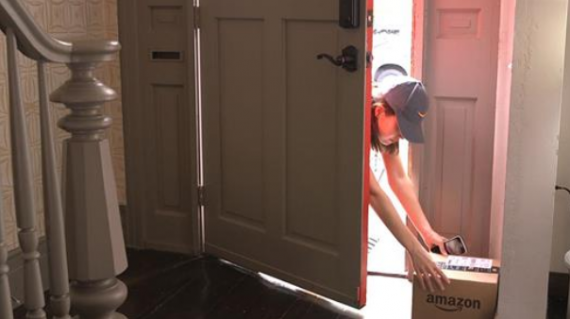

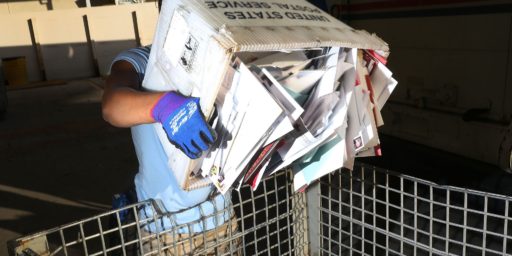
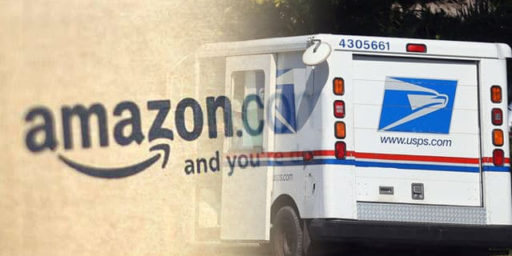
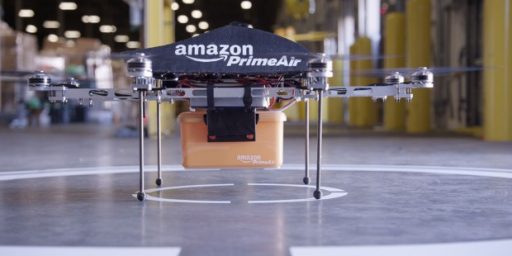
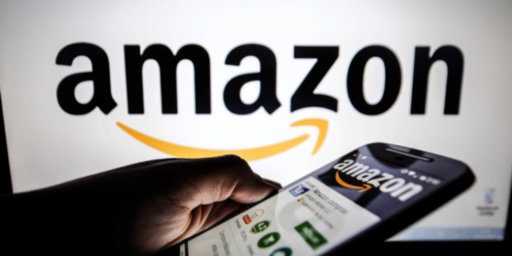
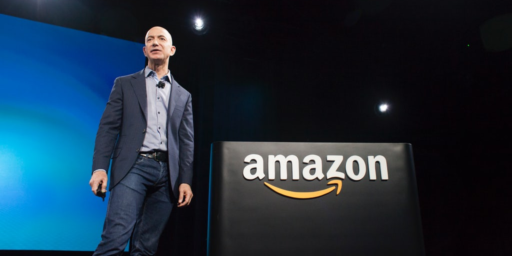
Walmart wants to do the same thing–to deliver groceries and tuck the perishables into your fridge.
I. Don’t. Think. So. Especially not if I have to buy a couple of hundred dollars worth of equipment to admit and track the deliverers.
I guess Amazon (and Walmart from CSK’s comment) think they have found the magic defense against data breaches.
I won’t be signing up either. But Amazon already knows way too much about you, and me. The privacy boat sailed long ago.
@Moosebreath:
Oh, yeah. They’re probably right up there with Equifax in terms of security.
@gVOR08:
You’re right. Which is why I’ve never ordered a thing from Amazon.
Personally, I like the idea… but I don’t need it as I live way in the sticks.
There is a real solution for this. In high density areas (like when I lived in Brazil), every multi-tenant building had a doorman.
So, Amazon has come up with a virtual doorman (unlock, video the delivery, relock). But… just like the “uncanny valley” in androids, there is that part of us that says … nope. I’m ok up to a certain point, but then.,.. nope.
Solution: Make the milk delivery chute of old updated. If this type of delivery becomes accepted, then homes will be designed with a secure vestibule (like in homes of old). Exterior doors can be unlocked by services, and an interior door that can be unlocked only by the homeowner.
It would be relatively easy to retrofit this type of dual-door design, but weigh that against the $30 cost of a set of headlight bulbs coming from amazon, I’m OK with the box sitting on the porch.
I’m a really big Amazon user, but won’t be going for this. With the camera it might be OK, but I live at the end of a road down a 300ft long driveway, so I’m not too concerned about the packages left on the porch. It even has a roof, so rain isn’t really an issue.
I wonder if one of my life lessons is relevant, and Amazon won’t end up regretting this. Not for what their people actually do, but for what the public believes they do. Back in the dark ages when I was a college dorm RA, all the residents had keys to their own doors, and I had a master key, just in case, used mostly for people that had gotten locked out. I don’t think anyone thought I was dishonest, but the idea that there were master keys out there had a pernicious effect. One day one of my residents came into the common room. She was really upset. She had laid an expensive necklace on her bed and gone to dinner. When she came back, it was gone. Someone with a key had gone in there and taken it! Later that night, someone else reported that something had been stolen under similar “locked room mystery” circumstances. A few days later, another. Rumor spread that someone had a master key and was coming into rooms at will. People complained to me, complained to the Area Director, demanded that all locks be changed. Then, the first woman showed up wearing her necklace. Somehow it had gotten tucked into the corner of the sheet folded under the mattress when she made her bed. Another item turned out to have been borrowed by a roommate who was away visiting. I think at least one other mystery was solved in a similar way. But the idea that there was a thief with a master key never really died down. Once people had it in their minds, it came up again every time someone lost something.
“Gas man.” He yelled as he let himself in the side door and down the steps to read the meter.
The water meter reader played out the same routine as both gauges were in the basement.
I remember where we were living so this had to be early 1950’s.
When I asked my mom how they got in if we weren’t home she said they had skeleton keys that would open all the doors in the neighborhood. Neat!
Home security was not something I spent any time thinking about.
The last time I lost the key to my 1977 Park Avenue trailer house I wrenched my back so bad climbing through the window to get in that I had to lay on the floor and look at the ceiling for the rest of the day.
Never found the key. I haven’t locked the place up since. That was 20+ years ago.
Even when I have been gone on my annual two week road trips from the midwest to California the door will open with a twist of the knob.
The only thing that I own worth more than $5 at a pawnshop is my MacBook Air and I never leave it home when I’m gone.
Besides, locks are for honest people.
@Mister Bluster:
I like your style.
Uh, no, I’d rather the odd wet or missing package.
Um…I already don’t lock my door.
My car keys are in the console.
Welcome to rural America.
BTW…I also have a .45…so don’t get any ideas.
@Mister Bluster:
In Michigan, both of those extended into the ’70’s. We were a more open and trusting culture then.
Now, some “patriot” would likely shoot someone.
@CSK: Have you seen any credible reports of data breaches originating at Amazon?
They are a high value target for hackers. They have either been very lucky, or they are at least doing a few things right.
@CSK:..thank you
We are an Amazon Prime household and live in a fairly rural-ish area of New Hampshire. There is no way we are signing up for this–first and foremost, as a friend of mine put it when she posted this article on FB, our dog would tear anyone unexpected in the home apart (we think. She certainly sounds ferocious when someone approaches the home.)
Thankfully, package theft isn’t really an issue where we are–our little cul-de-sac is about 50% retirees or work from home folks, and more than half have dogs.
In addition to the security issues this brings up, I wonder what this means for homeowner’s insurance. Most of the time when you hand your key over, it’s to an individual (like a contractor or cleaning person) or a business set up expressly to deliver a service. The employees are generally licensed, bonded, and insured–and are often subject to background checks. If there’s ever a theft or damage issue, your homeowners insurance generally covers it–or, the individual or business. Going up against Amazon? No thanks.
Is anyone else at all familiar with the cops’ Plain View Doctrine, that all first responders enjoy.? “Hey Officer Friendly, would I be a good citizen if I told you about a customer’s stash? Yeah, here are the details.”
@Mister Bluster:
You do realize that if you leave your trailer unlocked Trump will sneak in with prostitutes and watch them pee on your bed?
You need to think through all the facts before you make these life decisions, man.
@Liberal Capitalist :
I’m honestly shocked this isn’t already a thing. My family’s been doing this for years – the entry hall for the main door is never locked and is a pretty decorative thing. The hall is made of good solid brick and the interior door’s made of steel and locked till next Sun. This way, anyone who needs to can leave mail or the occasional cookies, seek shelter from the elements, return lost pets, etc. The delivery guys love it because we leave snacks out for them when they come in to drop stuff off. Our entire neighborhood -minus the new builds – has the same layout so it’s not that old a concept. It’s kinda common sense, if you think about it but as most posters said, there’s something visceral about “letting people into your home” I’ll bet most of the holdouts don’t have a hall but rather an open layout, making this idea a touch problematic.
@Doug Huffman:
I believe it has to be in plain view of the cop. Not in plain view of someone else who happened to enter a home. In your scenario, the cop would then have to enter the home him/herself and then see in “plain view” the stash. Which means they would be violating the 4th amendment.
So not quite applicable.
Something tells me these cameras they want to install are a lot more about protecting amazon from liability, so that the homeowner gets sued when a dog attacks the delivery person instead of Amazon.
Maybe we all just need bigger mailboxes.
Realtor.com posted an article providing five very good reasons NOT to sign up for this service.
http://www.realtor.com/news/trends/5-reasons-may-not-want-sign-amazon-key
My favorite unreasonable position on this so far has been one from one of the on-air financial/consumer advice gurus who is unwilling to allow Amazon key and also won’t pick up the package at a drop box because “I’m paying for door to door delivery, not to go someplace and schlep the box home myself.”